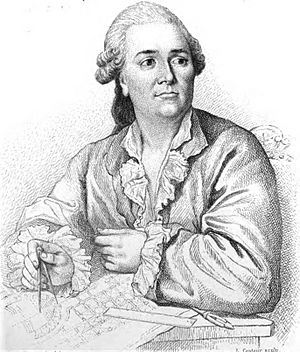Victor Louis facts for kids
Quick facts for kids
Victor Louis
|
|
|---|---|

Victor Louis
|
|
| Born | 10 May 1731 Paris, France
|
| Died | 2 July 1800 (aged 69) Paris, France
|
| Nationality | French |
| Occupation | Architect |
| Spouse(s) | Marie-Emmanuelle Bayon Louis |
| Children | Marie-Hélène-Victoire Louis |
Victor Louis was a famous French architect. He was born in Paris, France, on May 10, 1731. He passed away in Paris on July 2, 1800. He is best known for designing the amazing Grand Théâtre de Bordeaux.
Contents
About Victor Louis's Life
Victor Louis was born with the name Louis-Nicolas Louis. He later changed his name to Victor. This happened after he visited Poland in 1765. In 1770, he married Marie-Emmanuelle Bayon. She was a talented pianist and composer. They had a daughter named Marie-Hélène-Victoire in 1774. A book about Victor Louis's life was written in 1881.
Victor Louis's Amazing Buildings
Victor Louis created many impressive buildings. His most famous work is the Grand Théâtre de Bordeaux. This beautiful theater was finished in 1780.
He also designed other theaters. These include the Salle Richelieu in Paris, built in 1790. This building later became the home of the famous Comédie-Française. The Salle Richelieu was special because it had a roof made of iron. Iron was chosen because it was much safer from fire than wood.
Another theater he designed was the Théâtre National de la rue de la Loi. It was built in 1793 but was later taken down.
Other Important Projects
Victor Louis designed other important buildings too.
- The Intendance in Besançon was completed in 1776.
- He designed the garden galleries of the Palais-Royal in Paris. These were built between 1781 and 1784.
- He also worked on the Salle de Beaujolais from 1782 to 1783.
- The Château du Bouilh near Bordeaux was another project. He worked on it from 1786 to 1789, but it was never fully finished.
Gallery
-
Intendance, Besançon (garden facade)
-
Design for the garden galleries of the the Palais-Royal
See also
 In Spanish: Victor Louis para niños
In Spanish: Victor Louis para niños
 | James B. Knighten |
 | Azellia White |
 | Willa Brown |












